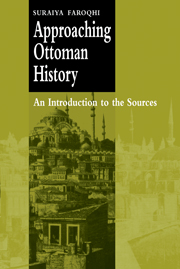Book contents
- Frontmatter
- Contents
- List of illustrations
- Acknowledgements
- 1 Introduction
- 2 Entering the field
- 3 Locating Ottoman sources
- 4 Rural life as reflected in archival sources: selected examples
- 5 European sources on Ottoman history: the travellers
- 6 On the rules of writing (and reading) Ottoman historical works
- 7 Perceptions of empire: viewing the Ottoman Empire through general histories
- 8 Conclusion
- References
- Index
2 - Entering the field
Published online by Cambridge University Press: 10 November 2009
- Frontmatter
- Contents
- List of illustrations
- Acknowledgements
- 1 Introduction
- 2 Entering the field
- 3 Locating Ottoman sources
- 4 Rural life as reflected in archival sources: selected examples
- 5 European sources on Ottoman history: the travellers
- 6 On the rules of writing (and reading) Ottoman historical works
- 7 Perceptions of empire: viewing the Ottoman Empire through general histories
- 8 Conclusion
- References
- Index
Summary
PRELIMINARIES: LANGUAGE AND CULTURAL SKILLS
The present chapter being directed at the student entering the field, a few words should be said about the languages which the future Ottoman historian will need for his/her research. Here it is important to be realistic, and we will need to distinguish scholarly ideals from what can be realised with the practical possibilities at hand. Indispensable for everyone are Ottoman and modern Turkish, along with English as the major means of access to the international scholarly community. Ottoman is easier to learn if one already knows some Turkish; but experience with Turkish undergraduates has shown that the task is not easy even for them. Speakers of Arabic sometimes acquire access to Ottoman by learning the basic rules of Turkish grammar and using their knowledge of the script and large chunks of vocabulary. In this case, it must be remembered that the meanings Ottomans attached to Arabic loanwords are often different from those which the same words bear in the language of origin.
What other languages will be learnt depends on the questions the historian proposes to study. Alternatively, certain scholars may select their future fields according to the languages they already know. It is a truism, that anybody with more than a casual interest in early modern Balkan history should learn Ottoman in addition to Greek, Serbian, Bulgarian or whatever language is relevant. But in real life, this rule is often violated. Arabic is an absolute necessity for those people wishing to study not only the Arab provinces of the empire, but also the history of Ottoman science or law.
- Type
- Chapter
- Information
- Approaching Ottoman HistoryAn Introduction to the Sources, pp. 27 - 45Publisher: Cambridge University PressPrint publication year: 1999

